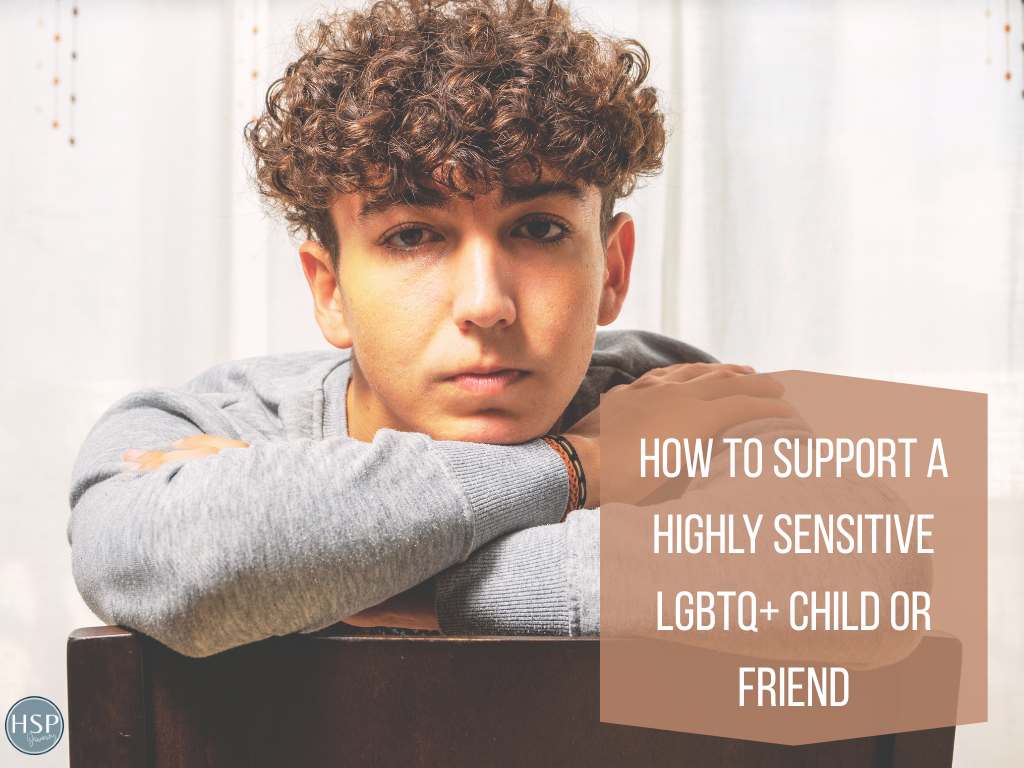Maybe you’ve watched them retreat to their room after a family gathering, or come home from work drained after navigating office dynamics all day and overwhelmed by the noise or energy. Maybe you’ve seen their shoulders tense and face crumple when someone uses the wrong pronoun, or noticed how deeply they feel every sideways glance. If someone you love is both highly sensitive and LGBTQ+, you know their world can feel both incredibly rich and sometimes painfully intense.
Your child, friend, or family member experiences life with their whole being. Every emotion hits deeper, every sting hurts a little longer, but every moment of acceptance and love also fills them more completely than you might imagine.
This article will share how to support and be the safer place they need in a world that doesn’t always understand either part of who they are.

Table of Contents
When two misunderstood identities meet
Picture this: your loved one walks through the world with emotional antennae constantly picking up a myriad of signals. They hear the hesitation in your voice when you’re learning their new name. They notice who avoids eye contact and who genuinely smiles. They feel the tension when having to come out again to another new person.
Being highly sensitive isn’t a disorder or something that needs fixing, it’s how their nervous system is wired. And being LGBTQ+ isn’t a phase or a problem, it’s another part of who they are. When someone carries both identities, they’re often misunderstood twice over.
What this means for you:
- That unexpected meltdown could be overwhelm from navigating a world that feels too loud and too judgmental.
- Their need for alone time isn’t rejection of you, it’s how they might need to recharge their emotional batteries.
- When they share something about their identity, they’re trusting you with their most vulnerable self.
#1 Way to Support Your Sensitive LGBTQ+ Child or Friend: Your Home Can be Their Safe Space
Think about the last time you walked into a space where you felt completely accepted. That exhale of relief, that softening of your shoulders, that’s what you can create for them every single day.
Here are some small changes that make a huge difference:
- Lower your voice when they seem overwhelmed (they’ll hear the care, not just the words).
- If you have space, keep a quieter part of the house where they can retreat when the world feels too much.
- Use their chosen name and pronouns like they’re the most natural thing in the world (because they are).
- Notice their energy levels and respect when they need space.
I spoke to a parent who started dimming the lights and speaking softer when their teenager came home from school and they went from barely speaking to actually sharing their day.
#2 Way to Support Your Sensitive LGBTQ+ Child or Friend: The Art of Just Being There
When they come to you upset, maybe crying about what someone said or frustrated about their body or anxious about coming out to others, your instinct might be to jump into problem-solving mode. But here’s what they often need more than solutions: they need to know you’re not going anywhere.
Instead of: “Well, have you tried talking to the teacher?” You can try, “That sounds so hard. I’m here with you.”
Instead of: “Don’t let it bother you so much.” Try, “Your feelings make complete sense. Tell me more.”
Sometimes the most powerful thing you can say is, “I don’t know what to say, but I love you and I’m not going anywhere.”
#3 Way to Support Your Sensitive LGBTQ+ Child or Friend: See Them, Really See Them
Your highly sensitive LGBTQ+ loved one has probably spent a lot of time feeling like they’re too different, too complicated, too emotional. You have the power to rewrite that story by actively looking for moments to affirm who they are.
Tell them, or perhaps leave little written notes or messages that say things like
- “I’m so proud of who you’re becoming.”
- “Your ability to pick up on how people are feeling is such a gift.”
- “The way you express yourself is beautiful.”
- “I love your brave heart.”
You never know when or how important those kind messages will be.

#4 Way to Support Your Sensitive LGBTQ+ Child or Friend: Teaching them to protect their energy
Imagine trying to navigate workplace dynamics, dating, or school when every harsh comment cuts deeper, every social interaction requires energy you don’t always have, and you’re also learning to live authentically in a world that might not fully accept you. They need tools, understanding and practical ways to help, for example:
- You can create a recharge ritual together, maybe it’s a walk, or a favorite place or your favorite meal.
- Model boundaries yourself, saying things like “I’m feeling overwhelmed, so I’m going to step outside for a few minutes” and show that its ok to listen to your needs.
- Help them identify the early warning signs of their own feelings of overwhelm.
Looking for HSP Tools to Thrive in a Chaotic World?
The modern world is often overwhelming and stressful for those of us with sensitive nervous systems. Many of us have suffered from the challenges of high stress, anxiety, sensory overload, and mental health and physical health issues. Fortunately, after years of working with and researching Highly Sensitive People (HSPs), Julie Bjelland has developed many tools that have not only helped her but thousands of HSPs all over the world move out of survival mode living and into thriving. In this free webinar, she’ll share the tools that HSPs have found the most life-changing. Her goal is to help you live to your fullest potential because the world needs you.
Join this free webinar and get tools to help you thrive as an HSP!
When the World Isn’t Kind
There will be days when they may face discrimination, perhaps someone misgenders them deliberately or they’re excluded from a group. As someone who loves them, this might make your blood boil. Channel that protective energy into supportive action if you can.
Your role as their advocate:
- Speak up when it’s safe to do so (and teach them it’s okay not to, when it’s not safe)
- Have their back in situations that might get tense, especially in family scenarios
- Be available to contact schools or organizations if needed
- Research their rights together so they feel empowered
- Remind them that other people’s ignorance says nothing about their worth
You don’t have to be perfect at this and do everything. You just have to try, and let them see you trying.
Finding Their People
The mainstream LGBTQ+ scene might feel overwhelming for highly sensitive souls, it can be too loud, too intense and sometimes too much. The typical social groups might not get their sensitivity. Help them find spaces where both parts of who they are can breathe.
Ideas to explore together:
- Quiet LGBTQ+ book clubs or hobby groups
- Online inclusive communities for sensitive people
- Nature-based groups with inclusive values
- Creative workshops or writing circles
- Volunteer opportunities aligned with their values
- Finding a coach who specializes in sensitive LGBTQ+ people
Community doesn’t have to be a huge loyd party. Sometimes it’s three people who really get each other, meeting for a cup of tea and supportive conversation.

Looking for an HSP-Trained coach to help you align your life with your priorities?
Through my Highly Sensitive Person (HSP) certification with the Nickerson Institute, as well as being an HSP, I offer HSP coaching to develop specific goals around your HSP needs. We HSPs frequently deal with anxiety and overstimulated nervous systems that prevent us from achieving peace and attaining our life goals. HSP coaching with me includes a detailed review of your sensitivities and a mutually-desired plan for growth and management of this superpower to shift negativity and begin seeing yourself as the hero of your own story. (Affordable monthly coaching begins at $150/month.)
Trust Their journey
Here’s what I want you to know: they might not have everything figured out at 20, or 30, or even 40. They might change their name twice, try different pronouns, explore different relationships, or take time to understand their place in the world. Their sensitivity might make life transitions feel more intense and they may need more processing time.
And that’s ok. They’re not broken or irrationally confused. They’re learning to listen deeply to themselves in a world that usually wants quick answers to complex questions.
Your job isn’t to:
- Rush their process
- Understand everything immediately
- Have all the right words
- Fix their struggles
Your job is to:
- Show up consistently.
- Love them through the uncertainty.
- Celebrate every step of their journey.
- Trust that they know themselves better than anyone else.
A Note for the Harder Days
Some days, supporting someone who feels everything so deeply can be tiring, especially if you’re highly sensitive as well. Some days, you might worry you’re not doing enough, saying enough, being enough. Some days, you might grieve the simpler path you imagined for them. Some days, you might wish things could be easier for them.
All of these feelings are valid so remember to take care of yourself too. Seek support from other parents, friends, or counselors who understand. Your loved one needs you to be whole and emotionally available, they don’t need you to be perfect.
The Ripple Effect of Your Support
When you create safety for one highly sensitive LGBTQ+ person, you’re doing something profound. You’re showing them that love is possible, that they deserve care, that their sensitivity is a gift to be cherished and not hidden.
They’ll carry that with them forever. They’ll offer that same grace and kindness to others. They’ll help create a world where the next sensitive, queer kid feels a little less alone.
Your love, imperfect, learning, growing, is changing the world one heart at a time.
Remember: You don’t need to be the perfect ally or parent or friend. You just need to be present, curious, and caring. That’s enough. That’s everything.
Be sensitive, be free
*This post contains affiliate links and I will be compensated if you make a purchase after clicking on my links*




